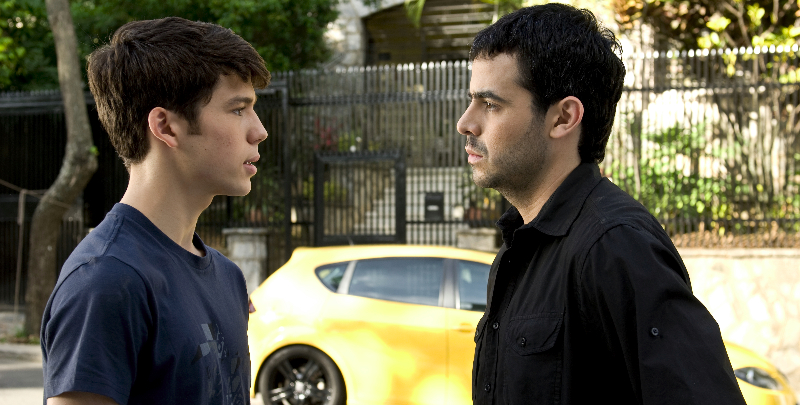One recent evening immediately after we finished watching CHEF -- probably the most popular would-be "independent" film of the current year and a movie that everyone I know who goes to movies seemed to enjoy -- my spouse declared, "Feel-good movies are like pornography." "What do you mean?" I immediately asked him. He shrugged and answered, "I just feel that way about them." I mulled over his statement -- which all of a sudden seemed to make very good sense. "Are you saying," I enquired, "that watching pornography gives you inflated -- and mostly wrong -- notions about sex and how it should be, in the same way as feel-good movies give you inflated -- and mostly wrong -- notions about life and how it should be?"
"Yes," spouse replied. "That's it." Now, we both had enjoyed Chef, which is very cleverly written, acted and directed. But because everything -- and I mean every single thing in the movie -- works out as needed to leave everyone getting exactly what they want and as happy as clams, the aura of feel-good hangs over this film so heavily that it ought to make it difficult for a thinking person to embrace the movie fully. Interestingly, the fact that it is so very well-made (it's written and directed by Jon Favreau, pictured above) is an irony that actually adds to its burden. If it weren't so damn clever and enjoyble, you could see through it more quickly and keenly.
AZUL Y NO TAN ROSA (Blue and Not Quite Pink, in the English translation), which is being released to DVD with the simpler but not nearly as smart title, My Straight Son, is much less glossy and expertly finished yet is by far the stronger film. More melodramatic than it needs to be, and biting off such a huge chunk of "life" that you just know it won't be able to digest it all, the movie (written and directed by Miguel Ferrari, shown at right) turns out to offer us nothing less than the coming-of-age of an entire country, Venezuela -- from individuals and family to police, priests and the media. The subject, around which the movie circles and about which the populace is educated, concerns the rights of "the other," with particular emphaiss on the GLBT population.
While Chef busies itself with the plight of the entitled to keep doing what it wants and what will bring it greater fortune and fame, Azul-Rosa/Straight Son cuts a swath through Venezuelan society that takes in various classes and cultures. Both films are quite entertaining, but what makes Chef so pornographically feel-good -- its characters getting everything they want without real life once intruding -- is what does not occur, and thus saves the Venezuelan film from that morally smarmy and skeevey overlay.
The protagonists here are the gay dad, fashion photographer Diego (Guillermo García, above, right), and his straight teenage son, Armondo (Ignacio Montes, above, left). The two have not seen each other for some years, and now Armondo, who lives in Spain with his mom, has come for an enforced and extended visit with a dad at whom he is very angry, and who is about to start a new life with his lover, a successful and kindly gynecologist named Fabrizio (Sócrates Serrano, below).
For his part Armondo becomes involved with a young girl on the Internet, and romance -- via the tango -- begins to stir. In the course of the story, which takes a few unexpected turns, the major characters must come to terms with death and rejection -- hardly staples of the feel-good genre -- while the supporting players, particularly the transgendered entertainer, Delirio (Hilda Abrahamz, below, left), and Perla Marina, Diego's assistant at work (Carolina Torres), are faced with their own issues of finding one's place in the world and spousal abuse.
By the end of this rich and rewarding movie, progress has made made on all fronts. But it's progress, not massive achievement, which again sets the film apart from its feel-good companions. How the son's relationship with his tango-loving girlfriend, below, comes to its conclusion provides yet another road that the feel-good film would never travel.
Especially fine is the manner in which the movie handles a popular Venezuelan TV show and its anything-for-ratings hostess (Beatriz Valdés, below). This is absolutely plum, and the short speech given by Delirio at movie's end, which in other circumstances might be heavy-handed, here seems just about perfect.
This TV show is watched by, it would seem, the entire Venezuelan populace, including Diego's parents (shown below), and his father's reactions to the the hostess, to his son's homosexuality, and to the priest who appear on the show to speak against gays and gay marriage, are interestingly contradictory and seem absolutely real.
For all its minor faults and occasional melodrama, on balance Blue and Not Quite Pink achieves a state of grace by virtue of its ability to confront its country's prejudices and hatreds and then help lift both its characters and the country out of the swamp of stupid consumerist culture into something approaching a little wisdom.
Both films have recently made their DVD debuts and interestingly enough have the same running time of 114 minutes. While Chef -- from Univeral Pictures -- has probably been viewed by one hundred times the audience that will see My Straight Son, I urge you to check out the latter, from TLA Releasing, and available now for both sale and rental.















No comments:
Post a Comment